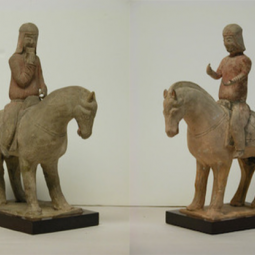
Noa Hegesh is a historian of sound, interested in musical thought and in sound as a technology in Early and Early Medieval China. Her research explores how people thought about sound shaped the tuning theories they used and led to developments in music theory and acoustics. Specifically, her research focuses on the use of sound and tuning calculations outside of musical performances per se, in areas such as astronomy, cosmology, metrology, politics, ritual, and divination.
Noa is a postdoctoral fellow of the Max Planck Institute for the History of Science, Department III (Artifacts, Action, Knowledge) and a member of the Research Group "Epistemes of Modern Acoustics." Her project at the MPIWG focuses on the Period of Division in China (focusing on the fourth to sixth centuries), when foreign conquest, decentralization of power, and the rise of Buddhism and Daoism introduced deep social, political, and cultural changes that shaped, reshaped, and challenged the discourse about sound and its uses.
Noa earned a doctorate in East Asian Languages and Civilizations from the University of Pennsylvania. Her dissertation is entitled "In Tune with the Cosmos: Tuning Theory, Cosmology, and Concepts of Sound in Early China." Noa holds a BA in musicology and East Asian studies, and an MA in East Asian studies, from Tel Aviv University. Her awards include the University of Pennsylvania President Gutmann Leadership Award (2016) and the Center for Teaching and Learning’s Graduate Fellowships for Teaching Excellence (2016–2017).
Noa Hegesh was a Postdoctoral Fellow at the MPIWG between 2018–2021 and returned in summer 2022 as a visiting scholar.
Current Projects
Completed Projects
Selected Publications
Hegesh, Noa (2022). How Can Sound Help Us to Better Understand Early and Medieval China? (film). Latest Thinking. https://doi.org/10.21036/LTPUB101056 .
Read More
Hegesh, Noa (2021). “Mind the Gap: Acoustical Answers to Cosmological Concerns in First-Century B.C.E. China.” Isis 112 (4): 645–669. https://doi.org/10.1086/717069.
Read More
Hegesh, Noa (2020). “The Sound of Weights and Measures.” Nature Physics 16 (11). https://doi.org/10.1038/s41567-020-01077-z.
Read More
In the Media
Presentations, Talks, & Teaching Activities
Univeristy of Pennsylvania
Body and Cosmos in China: An Interdisciplinary Symposium in Honor of Nathan Sivin
Berea College
Guest Lecture at the Asian Studies Colloquium Series (co-sponsored by the dept. of music)
Association for Asian Studies (AAS) Annual Conference



